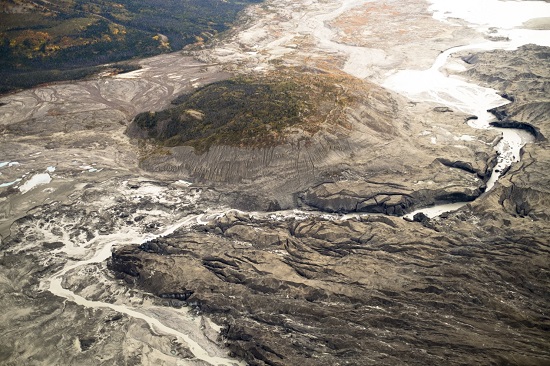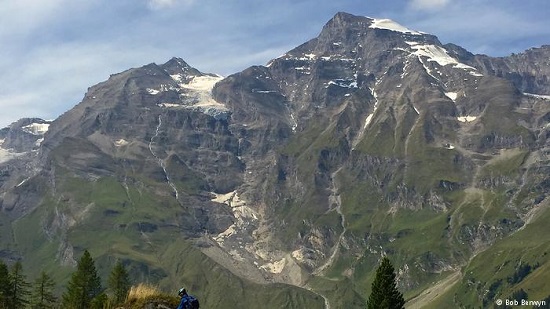2017 SkS Weekly Climate Change & Global Warming News Roundup #16
A chronological listing of news articles posted on the Skeptical Science Facebook page during the past week. Articles of signifigance as determined by the editor are highlighted in the Editor's Picks' section.
Editor's Picks
For the first time on record, human-caused climate change has rerouted an entire river

A stream flows through the toe of Kaskawulsh Glacier in Kluane National Park in the Yukon. In 2016, this channel allowed the glacier’s meltwater to drain in a different direction than normal, resulting in the Slims River water being rerouted to a different river system. (Dan Shugar)
A team of scientists on Monday documented what they’re describing as the first case of large-scale river reorganization as a result of human-caused climate change.
They found that in mid-2016, the retreat of a very large glacier in Canada’s Yukon territory led to the rerouting of its vast stream of meltwater from one river system to another — cutting down flow to the Yukon’s largest lake, and channeling freshwater to the Pacific Ocean south of Alaska, rather than to the Bering Sea.
The researchers dubbed the reorganization an act of “rapid river piracy,” saying that such events had often occurred in the Earth’s geologic past, but never before, to their knowledge, as a sudden present-day event. They also called it “geologically instantaneous.”
For the first time on record, human-caused climate change has rerouted an entire river by Chris Mooney, Energy & Environment, Washington Post, Apr 17, 2017
Climate change taking big bite out of alpine glaciers 
"It's almost time to say farewell to our glaciers," Austrian mountain farmer Siggi Ellmauer said, looking at the craggy summits across the Pyhrn valley. After a tour of the nature camp he's building for school kids, Ellmauer talks about how climate change is reshaping his world.
"As a child, I never would have thought they could vanish. Even 20 years ago there were still patches of ice up there on those north-facing slopes. I've watched, we've all watched the glaciers shrink here and across the country," he said.
"When will they all be completely gone?"
Climate change taking big bite out of alpine glaciers by Bob Berwyn, Deutsche Welle (DW), Apr 17, 2017
The Unfolding Tragedy of Climate Change in Bangladesh
In some places, the impact of climate change is obvious. In others, scientists predict that climate change will occur based on elaborate computer models. In Bangladesh, it is already happening at a scale that involves unprecedented human tragedy. I witnessed this in December 2016, when I visited Bangladesh to give some talks at the University of Chittagong.
December 9, 2016.“How do they survive?” I kept wondering as I walked the alleys of Old Dhaka, the capital of Bangladesh, a country with a population of 164 million on a landmass the size of New York State. People seem to be everywhere in Dhaka, in a churning frenzy of rickshaws, CNGs (Compressed Natural Gas vehicles), taxis, buses, horse-drawn carriages and people—16 million and rapidly growing. The newest arrivals, mostly climate change refugees, end up in decrepit slums.
December 18, 2016. “What will the sea do next,” I thought when I visited the remote village of Premasia, Bangladesh, at the junction of the Sangu River and the Bay of Bengal, south of Chittagong. The schoolchildren greeted us with spontaneous joyfulness, full of hope, despite the visible aftermath of Cyclone Roanu, which struck in May 2016, washing away homes and permanently ruining croplands from salt deposits. Their three-story concrete school, raised on stilts, served as a cyclone shelter during the storm. Isolated palm trees, now surrounded by water and beach, are haunting reminders that here once stood someone’s home. Rising sea levels are turning land into sea bottom, driving some people farther inland. Others rebuild repeatedly, just as Sisyphus kept pushing the rock up the hill.
December 25, 2016. “Bare rock in the high Himalayas?” I gasped as my guide Phuri Kitar Sherpa pointed out Machapuchare, also known as Fish Tail, an immense obelisk of stone perched above Pokhara, Nepal, a jumping off spot for trekkers and alpinists. A third-generation Sherpa guide, Phuri told me he rarely used to see bare stone on this holy site, now off limits to climbing and never summited. Climate change is responsible for a long-term decline in snowpack in the Himalayas, which exacerbates flooding in rivers that flow into Bangladesh.
The Unfolding Tragedy of Climate Change in Bangladesh, Guest Blog by Robert Glennon, Scientific American, Apr 21, 2017
Sun Apr 16, 2017
- NASA just snapped the first photos of a mysterious crack in one of Greenland’s largest glaciers by Chris Mooney, Energy & Environment, Washington Post, Apr 15, 2017
- Sea-level rise in California could be catastrophic, study says by Kurtis Alexander, SF Gate, Apr 12, 2017
- Exxon Tells Judge It Will Continue to Fight Climate Fraud Investigations by David Hasemyer, InsideClimate News, Apr 13, 2017
- The world shifts': Gov. Jerry Brown talks California, climate change and President Trump by Chris Megerian, Los Angeles Times, Apr 15, 2017
- NOAA Is Still Lacking an Administrator to Lead Agency by Brian Kahn, Climate Central, Apr 13, 2017
- El Niño shifts cholera burden onto East Africa by Robert McSweeney, Carbon Brief, Apr 10, 2017
- Earth can't stop, won't stop setting monthly warming records by Andrew Freedman, Mashable, Apr 14, 2017
- New York Times defends hiring extreme climate denier: ‘millions agree with him’ by Joe Romm, Think Progress, Apr 15, 2017
Mon Apr 17, 2017
- Climate Climax, Opinion by Editorial Board, Nepali Times, Apr 14, 2017
- Here's what we need to accelerate progress on the UN's 2030 Global Energy Goals by Peyton Fleming, Ensia, Apr 13, 2017
- Why scientists are fighting back. We’ve had enough of Trump’s war on facts, Opnion by Kenneth Kimmel, Guardian, Apr 15, 2017
- The Easiest Way to Help Save the Planet: Get a bike by Ellie Anzilotti, Fast Company, Apr 4, 2017
- Cool roofs: beating the midday sun with a slap of white paint by Dyani Lewis, Guardian, Apr 12, 2017
- Climate Change Deniers Have President Trump's Ear. But Now They Want Results by Justin Worland, Time Magazine, Apr 12, 2017
- Humans on the verge of causing Earth’s fastest climate change in 50m years by Dana Nuccitelli, Climate Consensus - the 97%, Guardian, Apr 17, 2017
- For the first time on record, human-caused climate change has rerouted an entire river by Chris Mooney, Energy & Environment, Washington Post, Apr 17, 2017
Tue Apr 18, 2017
- Climate Funds for World’s Poorest Slow to Materialise by Lyndal Rowlands, Inter Press Service (IPS), Apr 14, 2017
- Climate change taking big bite out of alpine glaciers by Bob Berwyn, Deutsche Welle (DW), Apr 17, 2017
- Models, observations not so far apart on planet's response to greenhouse gas emissions, Phys.org, Apr 17, 2017
- Justin Trudeau A ‘Stunning Hypocrite’ On Climate Change, Says Top Environmentalist by Alexander C Kaufman, Huffington Post US, Apr 17, 2017
- American Institute of Architects takes a stand on climate change by Lloyd Alter, TreeHugger, Apr 17, 2017
- As Climate Science Has Firmed, Role of Scientists Grows, Opinion by Paul Hanle, Climate Central, Apr 17, 2017
- Budget Cuts to Weather and Climate Monitoring Programs Are Likely to Cost Us a Lot More Than They Save by Mike White, Pacific Standard, Apr 17, 2017
- How Western civilization could collapse by Rachel Nuwer, Future, BBC News, Apr 18, 2017
Wed Apr 19, 2017
- Mexico’s 3 Big Steps Towards Comprehensive Carbon Pricing by Juan-Carlos Altamirano & Julia Martínez, World Resources Instittute (WRI), April 14, 2017
- Scientists and Activists Look Beyond the March for Science by Nicholas St. Fleur, Science, New York Times, Apr 17, 2017
- Democrats are being pressured to support a "bipartisan" carbon tax bargain no Republicans support by David Roberts, Energy & Environment, Vox, Apr 17, 2017
- As Climate Change Fuels Wildfires, Fighting Them Must Change, Report Says, Inside Climate News, Apr 18, 2017
- Trump advisers abruptly cancel meeting on fate of Paris climate accord by Joe Romm, Think Progress, Apr 18, 2017
- Harvard Scientists Taking Geoengineering Into the Field by Brian Kahn, Climate Central, Apr 18, 2017
- Scientists have discovered vast systems of flowing water in Antarctica. And that worries them. by Chelsea Harvey, Energy & Environment, Washington Post, Apr 19, 2017
- Report: Can't blame El Nino as global temps spike in March by Seth Borenstein, AP News, Apr 19, 2017
Thu Apr 20, 2017
- SkS Analogy 1 - Speed Kills by Evan, Skeptical Science, Apr 19, 2017
- Disease Burden Growing as Vector Insects Adapt to Climate Change by Zadie Neufville, Inter Press Service (IPS), Apr 18, 2017
- Is It O.K. to Tinker Withthe Environment to Fight Climate Change? by Jon Gertner, New York Times, Apr 18, 2017
- Scientists to March on Washington to Protest 'Alternative Facts' by Steve Baragona, VOA News, Apr 18, 2017
- Washington State Spearheads a Novel Clean Energy Solution for Starbucks, REI and Target by Julia Pyper, Greentech Media (GTM), Apr 19, 2017
- Neil deGrasse Tyson Warns Science Denial Could 'Dismantle' Democracy by Tracy Staedter, Live Science, Apr 20, 2017
- Changing minds on a changing climate by Karin Kirk, Yale Climate Connections, Apr 18, 2017
- Sunken Pleasure: California Will Need Mountains of Sand to Save Its Beaches by Annie Sneed, Scientific American, Apr 18, 2017
Fri Apr 21, 2017
- Climate change allows terrorists to thrive' by Irene Banos Ruiz, Deutsche Welle (DW), Apr 20, 2017
- The Carbon Brief Interview: Michael Gerrard by Leo Hickman, Carbon Brief, Apr 19, 2017
- Jerry Brown rallies climate change conference: ‘Stopping carbon will be like stopping a heroin addiction by Casey Tolan, The Mercury News, Apr 20, 2017
- Faith groups backing march see an ally in science by Ryan Cross, Science (AAAS), Apr 20, 2017
- We Just Breached the 410 Parts Per Million Threshold by Brian Kahn, Climate Central, Apr 21, 2017
- As the seas around them rise, fishermen deny climate change by Ed Lavandera & Jason Morris, CNN, Apr 21, 2017
- Why scientists are marching on Washington and more than 400 other cities by Joel Achenbach, Ben Guarino & Sarah Kaplan, Speaking of Science. Washington Post, April 21, 2017
- 4 Facts Every Science Marcher Should Know, Guest Blog by Christopher Volpe, Scientific American, April 21, 2017
Sat Apr 22, 2017
- This Graphic Puts Global Warming in Full Perspective by Brian Kahn Climate Central, Apr 19, 2017
- The Unfolding Tragedy of Climate Change in Bangladesh, Guest Blog by Robert Glennon, Scientific American, Apr 21, 2017
- Why I, a Christian, am marching for science by Tom Ritchie, San Francisco Chronicle, Apr 17, 2017
- 10 Climate Trends That Spell Trouble for Our Planet by Pam Wright, The Weather Channel, Apr 20, 2017
- Evangelical leaders find climate change message a tough sell by Joe Garofoli, San Francisco Chronicle, Apr 20, 2017
- Fossil Fuel Industries Pumped Millions Into Trump's Inauguration, Filing Shows by Marianne Lavelle, InsideClimate News, Apr 19, 2017
- Historians say the March for Science is ‘pretty unprecedented’ by Chris Mooney, Energy & Environment, Washington Post, Apr 22, 2017
- March for Science or March for Reality? by Lawrence M. Krauss, Scientific American, April 20, 2017
Posted by John Hartz on Saturday, 22 April, 2017



